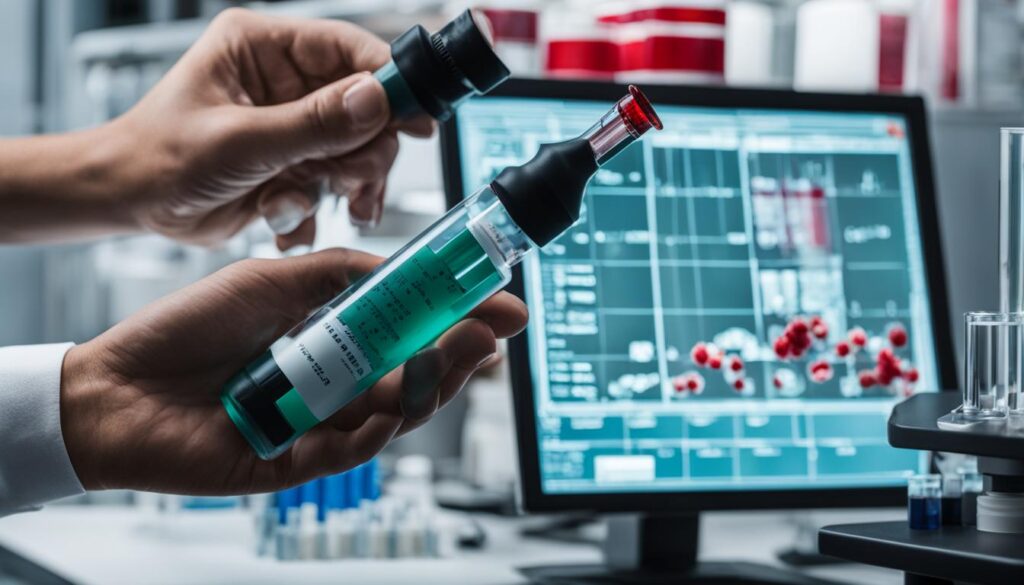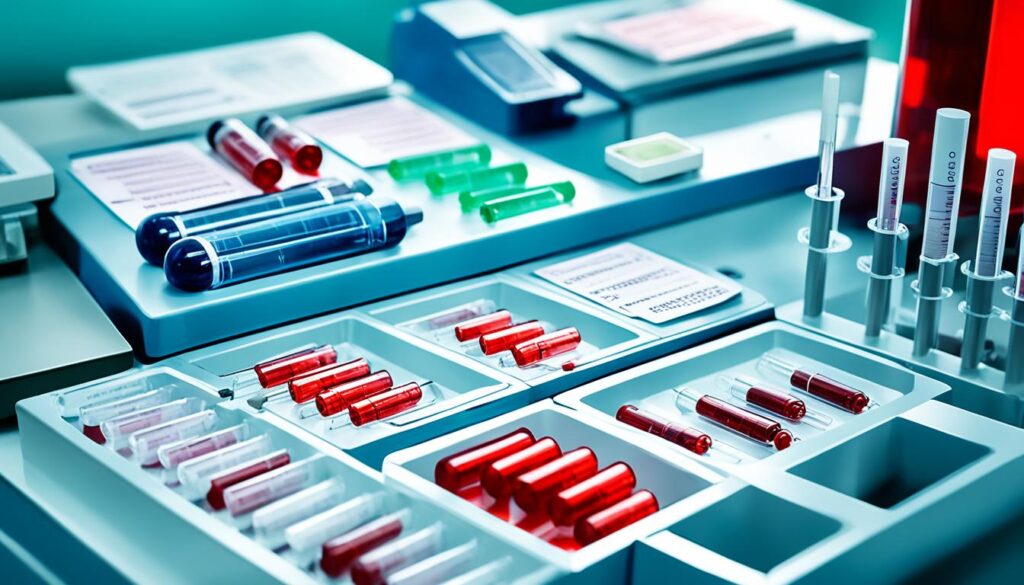Bowel cancer is a serious and prevalent disease, ranking as the fourth most common cancer in the UK and the second biggest cancer killer. Early detection is essential for successful treatment and improved survival rates. If you’re concerned about bowel cancer, you may be wondering if blood tests can help in its detection. Let’s explore this topic and find out.
Table of Contents
ToggleBlood tests play a significant role in assessing your general health and can provide valuable information about potential indicators of bowel cancer-related bleeding. However, it’s important to note that blood tests alone are not used to diagnose bowel cancer. Instead, they can offer clues to aid in the diagnosis process.
To detect bowel cancer at early stages, more reliable testing methods are available. These include fecal immunochemical tests (FIT) and colonoscopy. These tests are specifically designed to identify bowel cancer and allow for prompt medical intervention.
Next, let’s delve into the different tests available for diagnosing bowel cancer and understand how they can help in its early detection.
Tests for Bowel Cancer
When it comes to diagnosing bowel cancer, there are several tests available that can provide valuable insights into your health. These tests can help detect the presence of bowel cancer, assess its extent, and guide treatment decisions. Here are some common tests used for diagnosing bowel cancer:
Faecal Immunochemical Tests (FIT)
One of the most widely used tests for bowel cancer is the Faecal Immunochemical Test (FIT). This non-invasive test checks for the presence of blood in the stool, which can indicate the presence of bowel cancer. FIT is simple and can be done at home using a test kit provided by your healthcare provider. The sample is then sent to a lab for analysis.
Colonoscopy
A colonoscopy is a procedure that involves using a flexible tube with a camera at the end to examine the entire length of the colon and rectum. This test allows for a thorough evaluation of the bowel, checking for any abnormalities or signs of cancer. During a colonoscopy, biopsies can also be taken, which can provide further information about the presence of cancer cells.
Flexible Sigmoidoscopy
Similar to a colonoscopy, a flexible sigmoidoscopy focuses on examining the lower part of the bowel. It uses a flexible tube with a camera to assess the rectum and the sigmoid colon, which is the part of the colon closest to the rectum. While this procedure does not examine the entire colon, it can still provide important information about the presence of bowel cancer.
CT Colonography (Virtual Colonoscopy)
A CT colonography, also known as a virtual colonoscopy, involves pumping gas into the bowel and then taking CT scans to create detailed images of the colon. This test can provide a visual representation of the colon and help identify any abnormal growths or polyps that may indicate the presence of bowel cancer.
Imaging Scans
In some cases, imaging scans such as MRI, CT, or ultrasound scans may be used to assess whether bowel cancer has spread to other parts of the body. These scans can help determine the stage of the cancer and guide treatment decisions.
In addition to these tests, blood tests can also be conducted to test for conditions related to bowel cancer, such as anemia or other abnormalities. These tests help provide a comprehensive assessment of your health and aid in the diagnosis and management of bowel cancer.
It’s important to remember that the specific tests recommended for diagnosing bowel cancer may vary depending on individual circumstances. Your healthcare provider will determine the most appropriate tests based on your symptoms, medical history, and other factors. Early detection through these tests can significantly improve the chances of successful treatment and better outcomes for individuals with bowel cancer.
| Test | Description |
|---|---|
| Faecal Immunochemical Tests (FIT) | Checks for the presence of blood in the stool as an indication of bowel cancer |
| Colonoscopy | Uses a flexible tube with a camera to examine the entire length of the colon and rectum; allows for biopsies to be taken |
| Flexible Sigmoidoscopy | Focuses on examining the lower part of the bowel using a flexible tube with a camera |
| CT Colonography (Virtual Colonoscopy) | Involves pumping gas into the bowel and taking CT scans to create detailed images |
| Imaging Scans | MRI, CT, or ultrasound scans used to assess whether bowel cancer has spread to other parts of the body |

Blood Tests for Bowel Cancer
While blood tests alone cannot diagnose bowel cancer, they can be used to monitor the disease and provide valuable information about your health. Blood tests that may be performed include:
- Complete blood count (CBC): This measures the different types of cells in the blood, indicating the presence of anaemia or infection.
- Liver enzymes: These tests assess liver function, as bowel cancer can spread to the liver.
- Urea and electrolytes: These tests evaluate kidney function, as bowel cancer can potentially affect the kidneys.
- Tumour markers: Some bowel cancer cells produce substances called tumour markers, which can be detected in the blood. These tests can indicate the effectiveness of treatment and provide early warning signs of cancer recurrence.

| Blood Test | Purpose |
|---|---|
| Complete blood count (CBC) | Measures different types of cells in the blood to indicate the presence of anaemia or infection. |
| Liver enzymes | Assesses liver function to detect any spread of bowel cancer to the liver. |
| Urea and electrolytes | Evaluates kidney function as bowel cancer can potentially affect the kidneys. |
| Tumour markers | Detects substances produced by bowel cancer cells, indicating treatment effectiveness and providing early warning signs of cancer recurrence. |
Testing for Bowel Cancer at Home: Faecal Immunochemical Test (FIT)
A FIT test is a noninvasive test that allows you to conveniently screen for bowel cancer in the comfort of your own home. It involves detecting traces of blood in your stool, which can be an early sign of bowel cancer. By identifying these early signs, you can take proactive steps towards diagnosis and potentially improving treatment outcomes.
To conduct a FIT test, you will receive a test kit that includes all the necessary instructions and materials. The process is simple and can be completed within a few minutes. You collect a small sample of your stool and send it to a specialized laboratory for analysis. The lab will examine the sample for the presence of blood, which could indicate the presence of bowel cancer.

The FIT test has been proven to be around 80% accurate in detecting bowel cancer, making it a reliable screening method. It can help identify the disease in its early stages, when treatment options are more effective and chances of survival are higher.
In India, the National Health Service (NHS) offers free FIT tests to individuals who meet specific criteria related to age and symptoms. If you are experiencing symptoms or are at a higher risk of developing bowel cancer, it is essential to take advantage of this screening option. However, even if you don’t meet the specific criteria, it is still highly encouraged to consider an at-home FIT test to check for early signs of the disease.
Additionally, Check4Cancer’s BowelCheck test kit is also available for individuals experiencing symptoms and seeking testing options. This test kit provides another avenue for convenient and reliable at-home testing for bowel cancer.
By taking the initiative to test for bowel cancer at home using a FIT test, you can play an active role in your own healthcare and potentially detect the disease in its early stages. Early detection can make a significant difference in the treatment and outcome of bowel cancer. If you have any concerns or questions about testing for bowel cancer, consult with your healthcare provider for guidance.
Conclusion
The early detection of bowel cancer is crucial for successful treatment and higher survival rates. While blood tests alone are not sufficient for diagnosing bowel cancer, they can provide valuable clues about a person’s general health and potential indications of cancer. However, other testing methods, such as fecal immunochemical tests (FIT) and colonoscopy, are more reliable for detecting bowel cancer in its early stages.
If you are experiencing symptoms or meet specific criteria, it is important to take proactive steps and get tested for bowel cancer. FIT tests, which can be done at home, are a noninvasive option for testing. These tests look for traces of blood in the stool and have been proven to be around 80% accurate in detecting bowel cancer. The NHS offers free FIT tests to eligible individuals, and Check4Cancer’s BowelCheck test kit is also available for those seeking additional testing options.
By being proactive about your health and getting tested if necessary, you can contribute to the early detection of bowel cancer and improve the chances of successful treatment. Remember, early detection saves lives, so don’t hesitate to take the necessary steps for your well-being. Stay informed, prioritize your health, and together we can fight against bowel cancer.
FAQ
Can blood tests detect bowel cancer?
Blood tests alone are not used to diagnose bowel cancer. They can provide clues about your general health, including indicators of bleeding caused by the cancer. Other testing methods, such as fecal immunochemical tests (FIT) and colonoscopy, are more reliable in detecting bowel cancer at early stages.
What tests are available to diagnose bowel cancer?
There are several tests available to diagnose bowel cancer, including fecal immunochemical tests (FIT), colonoscopy, flexible sigmoidoscopy, CT colonography (virtual colonoscopy), and imaging scans (MRI, CT, and ultrasound).
What are the blood tests conducted to test for bowel cancer?
Blood tests that may be performed to test for bowel cancer include full blood count (FBC), liver enzyme tests, urea and electrolyte tests, and tumour marker tests.
What is a FIT test and how accurate is it in detecting bowel cancer?
A FIT test is a noninvasive test that looks for traces of blood in the stool. It can be done at home, with a sample sent to a lab for analysis. FIT tests have been proven to be around 80% accurate in detecting bowel cancer.
Can blood tests alone diagnose bowel cancer?
No, blood tests alone are not sufficient for diagnosing bowel cancer. They can provide valuable information about a person’s general health and potential indications of cancer, but other testing methods such as FIT tests and colonoscopy are more reliable for detecting bowel cancer in its early stages.
How important is early detection of bowel cancer?
Early detection of bowel cancer is crucial for successful treatment and higher survival rates. Other testing methods, such as FIT tests and colonoscopy, are more reliable for detecting bowel cancer in its early stages. Taking proactive steps, such as getting tested if experiencing symptoms or meeting specific criteria, can contribute to early detection and better outcomes.


